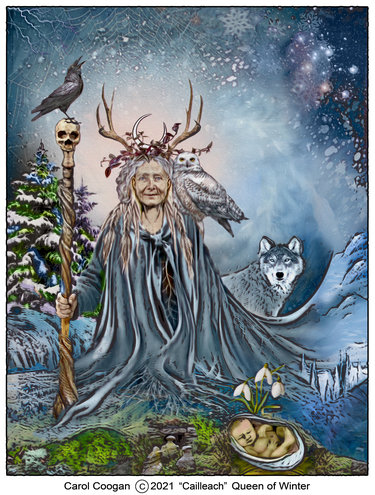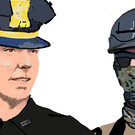‘The time to be happy is now’
When we look back at 2021 — a decidedly dark year with the pandemic engulfing us and at the same time isolating us, one from another — we take solace in the stories of lives well lived.
As we pore through 12 months of newspapers, we find comfort and joy in reading the many obituaries we printed this past year. They are stories of the everyday and the heroic. In the midst of grief, the light of a family’s love shines bright.
The darkness of winter, with the shortest days of the year, makes us think of Cailleach, the old woman goddess of Gaelic mythology who brings the storms and destruction of winter but overcomes death and darkness with transformative power.
She helps us accept the process of change. Just as the cold of winter is inevitably replaced with the warmth and rebirth of spring so, too, with the acceptance of death, those of us left in its wake can be guided by the light cast by those we love — and hold onto hope.
As we look at the words in our obituaries, we recall the people we talked to, sharing their love — sometimes fierce, sometimes stoic, sometimes gentle — of the people they cared for.
Some of the sentiments have stayed with us through these long, difficult months.
“The time to be happy is now”: That was the favorite saying of Dori Bode who died on Aug. 4, 2021 at the age of 86.
She had worked as a chairside assistant and office manager for her husband’s dental practice on Western Avenue. Perfecting people’s smiles seemed to us the right work for someone who had that favorite saying.
“She had a knack for bringing a smile to every situation,” her family said.
Many of the lives we recorded this year were, in themselves, lessons on how we should live.
“Ernie had farming in his blood and loved working with animals and being in nature,” said the family of Ernest Rau who died on Jan. 11, 2021.
After graduating from Guilderland, Mr. Rau had worked his way through college, cutting meat as a butcher at the old Greulich’s Market. He built the construction business that his son now runs.
“Ernie was always working at something and instilled good work ethics in all of his children whom he was so very proud of,” his family said. What better legacy than that to leave?
Roswell Eldridge, who died on June 3, 2021, was a Rensselaerville resident with a reach as wide as the world. His knowledge drew from the fields of art, medicine, nature, politics, automobiles, and more. A doctor, his work as a neurogeneticist helped move forward treatment of epilepsy and neurofibromatosis.
In the end, he retrained as a general practitioner and ran the Westerlo clinic once managed by the similarly esteemed Dr. Anna Parkins.
“Sometimes in the winter, when there were bad snowstorms, he would cross-country ski to do home visits to people who, maybe, were newly diagnosed with diabetes and needed assistance in learning how to manage their illness, or were post-discharge from the hospital after surgery,” said his daughter.
Toward the end of his life, Dr. Eldridge returned to a childhood passion he’d cultivated paging through his father’s leather-bound octavo of John James Audubon’s paintings of birds. “My father grew up looking through them and hearing his dad talk about the importance of understanding nature and protecting the natural world,” said Dr. Eldridge’s daughter.
Dr. Eldridge helped in having an easement placed on over 200 acres of Helderberg land.
He also had high-quality digitized prints made of the octavo artwork so that people wouldn’t cannibalize them, ripping out pages to be sold and framed.
Toward the end of his life, Dr. Eldridge spent a lot of time driving around the Hilltowns with his daughter and grandson, regaling them with stories about “the history of the community and his mother’s life growing up and how hard things were for the farmers, trying to farm on hilly land,” his daughter said.
We admire a man who cares about keeping books intact and also cares about preserving the roots of his community — the land — as well as tending to those he has the skills to help.
Another man who cared about the wider world while being firmly rooted here was Louis Fletcher Ismay. His nephew described him as an educator, lifelong advocate for social justice, champion of environmental causes, and one of the oldest grassroots activists in New York’s Capital Region. He died on Oct. 12, 2021, at the age of 96.
Mr. Ismay’s father was Jewish and emigrated from the Ukraine, arriving in the United States as Loyosh Israelovitch at age 12. “The only way we know what our last name used to be is because Lou tracked down a long-lost cousin,” said his nephew. That cousin’s entire family was wiped out in the Holocaust. Her mother and grandmother were killed immediately in the first concentration camp they were sent to; as a young girl, she was liberated from Auschwitz by the Allies.
“It was like filling a hole we never thought would be filled ...,” said Mr. Ismay’s nephew. “Lou filled this gaping hole in our family history; that was a tremendous gift for everybody.”
After Mr. Ismay came home from serving as an Army engineer during World War II, “He dedicated himself to peace and nonviolence, to secure human rights for everybody,” said his nephew. “He really believed in these things.”
Besides his devotion to peace and democracy, Mr. Ismay was devoted to caring for the environment. As a professor, he spurred his students to do the same; some have gone on to federal jobs and others are still working close to home, to protect the pine bush.
“He stayed in touch with many, many of us .… He always had a million ideas and always encouraged people to think about all kinds of different things,” said one of his students.
The lessons Mr. Ismay taught stretched far beyond his classroom and are still reverberating today.
Sometimes, we learned from this year’s obituaries, a singular love can propel a life’s journey. D. Frances Ripley found that love at the age of 4 when her grandmother taught her to knit. After that, fabric crafts became her life. She took up embroidery, tatting, and hooking among others.
She died on Oct. 5, 2021 at the age of 101.
She had been born in a lumber camp in Coeymans and was the last living graduate of the one-room schoolhouse in Dunnsville, her cousin told us.
She became a master needle crafter whose work was sought by museums. “She sewed a replica of the original Purple Heart that Martha Washington made, and she sewed drapes with gold thread for the governor’s mansion ….,” said her cousin. “She researched the original stitches; it was all hand-sewn.”
Ms. Ripley freely shared her love and knowledge of spinning and knitting each summer at the Altamont Fair’s Wool Nook. We talked to her there when she was in her 90s.
“What a joy this is. So much life. So much activity,” she said then, referring to the people in the sheep barn as “the shepherd’s family.”
Asked about her favorite project, she said it was usually what she was working on at the moment.
Of her 30 years in an embroidery guild doing historic reproductions, she said, “It was a wonderful opportunity to daydream.” She’d wonder what the people who made the originals had been thinking as they sewed — did they do it for a job, did they do it for posterity, did they hate the work?
“You invent all kinds of scenarios,” Ms. Ripley said.
We admired the way, even in her nineties, Ms. Ripley lived in the moment, enjoying her current work while reflecting on the work of those who had gone before her.
When she went blind, she had to give up embroidery. But she didn’t give up her first love — she continued to spin and knit.
So, as we enter the new year, we hope our readers, like us, will find strength and resilience in the stories of those who have gone before us — with humor, good will, hard work, love of community and family, passion for protection our Earth, and the courage to carry on with our passion even when we can no longer see.



